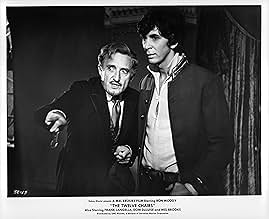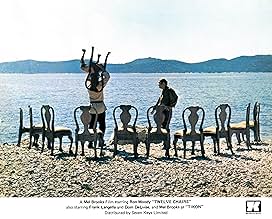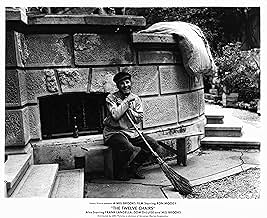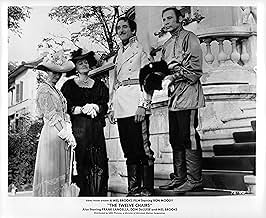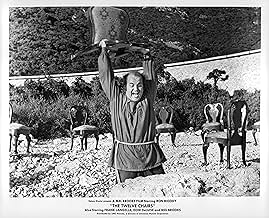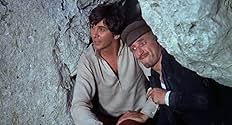IMDb RATING
6.4/10
7.5K
YOUR RATING
In 1920s Soviet Russia, a fallen aristocrat, a priest and a con artist search for a treasure of jewels hidden inside one of twelve dining chairs, lost during the revolution.In 1920s Soviet Russia, a fallen aristocrat, a priest and a con artist search for a treasure of jewels hidden inside one of twelve dining chairs, lost during the revolution.In 1920s Soviet Russia, a fallen aristocrat, a priest and a con artist search for a treasure of jewels hidden inside one of twelve dining chairs, lost during the revolution.
- Awards
- 1 win & 1 nomination total
Andréas Voutsinas
- Nikolai Sestrin
- (as Andreas Voutsinas)
Mladen 'Mladja' Veselinovic
- Peasant
- (as Mladja Veselinovic)
Petar Banicevic
- Sergeant
- (uncredited)
Dejan Cavic
- Orator
- (uncredited)
Featured reviews
A "serious comedy" from Mel Brooks. "The Twelve Chairs" borders on farce but is relatively restrained. This restraint is all the more remarkable in light of Dom DeLuise's manic attempts to take over. Ron Moody (who is best remember as Fagin in 'Oliver' on film and on the West End and Broadway)is superb. Frank Langella is less impressive, but he does bring the necessary character to the role. If you expect and want "Blazing Saddles" this movie is not for you. Nor is it as perfect a picture as "Young Frankenstein". But this Brooksian take on a Russian comedy of errors is well worth your attention. The belly laughs are few and far between, but the tugs on the heartstrings (along with some slapstick) suffice. If I am spare on the details, it is only because I have not seen this motion picture since its theatrical release in 1970; it's definitely one to which I have to renew my acquaintance.
Knowing that Mel Brooks usually makes the silliest movies possible, it's a surprise that he directed the lightweight comedy "The Twelve Chairs". It portrays a former Czarist (Ron Moody, happy birthday!) and a young soldier (Frank Langella) looking for some jewels hidden in chairs in the Soviet Union in the 1920s. I will say that not much really happens throughout much of the movie, but it is a famous part of Russian literature. I haven't read the novel, but the movie is worth seeing, if only as a look at Brooks's early career. Also starring Dom DeLuise and Brooks in a small role.
Epilepsy...
Epilepsy...
It is the forgotten Brooks movie. Probably because it has the most controlled script story, and had the least wild, satyric inventiveness of any of his films.
After he wrote and directed the original THE PRODUCERS, Brooks did not do another film for a few years. The second one was this one set in the post-Russian Revolution period in the Soviet Union. Ron Moody (Fagin in the musical OLIVER) is a minor Tsarist nobleman who discovers, when attending his mother-in-law on her death bed, that she hid her fortune in jewelry in one of the dining room chairs. There were a set of twelve chairs, and they were appropriated by the government to be given to deserving members of the proletariat. Moody discovers that his mother-in-law did confess this to one person besides him: the local Russian Orthodox Priest (Dom DeLuise). Moody finds the latter a difficult opponent to beat to the fortune first. By chance he falls in with a young swindler (Frank Langella) and he and Langella pursue the chairs, and also send DeLuise on a wild goose chase following a second set of similar chairs.
What we get is a view of the Soviet Union in 1928, as the Civil Wars died out and the regime consolidated power. Trotsky's name is now dismissed (as a street shows). The stage is dominated by the state oriented drama that is anti-capitalist. Witness the performance of Andreas Voutsinas - the original "Carmen Ghia" in the first PRODUCERS, as the government backed manager of the theater group that Moody and Langella join. There is a life and death threat behind comments he gives to one of the stage crew he controls. We also see how the common people try to cope with the changes - being sent across country on government sponsored jobs - to houses that the government may furnish.
Brooks has his first role in his own films in this one - as Tikhon, the drunken, ex-servant of Moody. He receives a slap from the latter, and considers it exactly like a hug.
Like IT'S A MAD, MAD, MAD, MAD WORLD, THE TWELVE CHAIRS looks at the antics people will go through for hidden wealth. Langella, who is a street criminal anyway, is the only sane member of the three treasure seekers. He is a realist (the first really serious one in Brooks' films), and has adapted to the new conditions fairly easily by living on his considerably keen wits. He realizes that he is hampered as well as helped by his alliance with Moody, but manages to figure out how to live with Moody as best as possible. Moody has become a bureaucrat to survive in the new regime (he's suspect as an aristocrat), but he still has his pretenses. It takes the events he shares with Langella for him to finally give up his pretenses. Together both men find out what is really worthwhile about living. DeLuise is less lucky. He just discovers the perils of being a loner.
After he wrote and directed the original THE PRODUCERS, Brooks did not do another film for a few years. The second one was this one set in the post-Russian Revolution period in the Soviet Union. Ron Moody (Fagin in the musical OLIVER) is a minor Tsarist nobleman who discovers, when attending his mother-in-law on her death bed, that she hid her fortune in jewelry in one of the dining room chairs. There were a set of twelve chairs, and they were appropriated by the government to be given to deserving members of the proletariat. Moody discovers that his mother-in-law did confess this to one person besides him: the local Russian Orthodox Priest (Dom DeLuise). Moody finds the latter a difficult opponent to beat to the fortune first. By chance he falls in with a young swindler (Frank Langella) and he and Langella pursue the chairs, and also send DeLuise on a wild goose chase following a second set of similar chairs.
What we get is a view of the Soviet Union in 1928, as the Civil Wars died out and the regime consolidated power. Trotsky's name is now dismissed (as a street shows). The stage is dominated by the state oriented drama that is anti-capitalist. Witness the performance of Andreas Voutsinas - the original "Carmen Ghia" in the first PRODUCERS, as the government backed manager of the theater group that Moody and Langella join. There is a life and death threat behind comments he gives to one of the stage crew he controls. We also see how the common people try to cope with the changes - being sent across country on government sponsored jobs - to houses that the government may furnish.
Brooks has his first role in his own films in this one - as Tikhon, the drunken, ex-servant of Moody. He receives a slap from the latter, and considers it exactly like a hug.
Like IT'S A MAD, MAD, MAD, MAD WORLD, THE TWELVE CHAIRS looks at the antics people will go through for hidden wealth. Langella, who is a street criminal anyway, is the only sane member of the three treasure seekers. He is a realist (the first really serious one in Brooks' films), and has adapted to the new conditions fairly easily by living on his considerably keen wits. He realizes that he is hampered as well as helped by his alliance with Moody, but manages to figure out how to live with Moody as best as possible. Moody has become a bureaucrat to survive in the new regime (he's suspect as an aristocrat), but he still has his pretenses. It takes the events he shares with Langella for him to finally give up his pretenses. Together both men find out what is really worthwhile about living. DeLuise is less lucky. He just discovers the perils of being a loner.
A long time ago, Mel Brooks had a subtle side.
Hard to believe, isn't it? The man responsible for such guffaw-fests as "Blazing Saddles", "Silent Movie", "High Anxiety" and such.... SUBTLE?
In "The Twelve Chairs", he does get laughs out of the story of a Russian nobleman searching for jewels sewn into one of twelve of his family's chairs that have been sold with the rest of his family's possessions. But not the way we're use to seeing Mel earn them.
This, time, he gets them through character study, human nature, individuals' reactions to certain embarrassing situations and, of course, good old-fashioned greed. And the laughs are there, to be sure.
I'm actually surprised that I liked this as much as I did. I'm used to Mel up there with the lampshade on his head, yucking it up with wild abandon. This film, subtle as it is, makes me laugh.
Of course, for purists, there's always good old DeLuise as another conniver searching for the same jewels. He makes with the wildness and insanity that makes a Mel Brooks film a Mel Brooks film, and he's a joy to see.
The others, Moody and Langella in particular, play regular human beings who see a situation, assess it and act as (nearly) anyone else would. More humorously, of course.
Seek out "The Twelve Chairs". Rare as it is, a rose by any other name....
And you know the rest.
Eight stars. Hey! Hey, hey, hey!
Hard to believe, isn't it? The man responsible for such guffaw-fests as "Blazing Saddles", "Silent Movie", "High Anxiety" and such.... SUBTLE?
In "The Twelve Chairs", he does get laughs out of the story of a Russian nobleman searching for jewels sewn into one of twelve of his family's chairs that have been sold with the rest of his family's possessions. But not the way we're use to seeing Mel earn them.
This, time, he gets them through character study, human nature, individuals' reactions to certain embarrassing situations and, of course, good old-fashioned greed. And the laughs are there, to be sure.
I'm actually surprised that I liked this as much as I did. I'm used to Mel up there with the lampshade on his head, yucking it up with wild abandon. This film, subtle as it is, makes me laugh.
Of course, for purists, there's always good old DeLuise as another conniver searching for the same jewels. He makes with the wildness and insanity that makes a Mel Brooks film a Mel Brooks film, and he's a joy to see.
The others, Moody and Langella in particular, play regular human beings who see a situation, assess it and act as (nearly) anyone else would. More humorously, of course.
Seek out "The Twelve Chairs". Rare as it is, a rose by any other name....
And you know the rest.
Eight stars. Hey! Hey, hey, hey!
The Twelve Chairs Years after the Russian Revolution in 1917, the former aristocrat Ippolit Matveevich Vorobyaninov (Ron Moody) is informed by his terminal mother-in- law that she has hidden her jewels in a the upholstery of chair from a set of twelve chairs. The Orthodox Father Fyodor (Dom DeLuise) also hears and leaves the Church to seek out the treasure. Vorobyaninov travels to his old house and meets his former servant Tikon (Mel Brooks) that adores him. He learns that the chairs had been expropriated by the new government and sent to another place. However the con artist Ostap Bender (Frank Langella) convinces Vorobyaninov to be his partner. They travel to Moscow where Ostap succeeds in luring Father Fyodor, telling that the chairs belong to the Engineer Bruns (David Lander), who has very similar chairs and lives with his wife in Siberia. Will Vorobyaninov and Ostap find the twelve chairs?
"The Twelve Chairs" is a typical Mel Brooks' comedy with the usual type of humor with a satire to the Russian Revolution. This comedy is also the debut of Frank Langella in the cinema. Fans of Mel Brooks will certainly like it, but who is not his fan may not find this comedy entertaining. My vote is six.
Title (Brazil): "Banzé na Rússia" ("Mess in Russia")
"The Twelve Chairs" is a typical Mel Brooks' comedy with the usual type of humor with a satire to the Russian Revolution. This comedy is also the debut of Frank Langella in the cinema. Fans of Mel Brooks will certainly like it, but who is not his fan may not find this comedy entertaining. My vote is six.
Title (Brazil): "Banzé na Rússia" ("Mess in Russia")
Did you know
- TriviaMel Brooks had problems with Yugoslavian extras who didn't speak English. In one scene, extras playing museum guards were supposed to walk through a museum, ringing hand bells and shouting, "Closing time! Closing time!" Instead, the extras misunderstood and shouted, "Cloakie Bye! Cloakie Bye!" Brooks decided "Cloakie Bye" was funnier, so he left it in the movie.
- GoofsDuring the chase through the train yard, a modern era bus can be seen passing in the background.
- Quotes
Ostap Bender: [after yet another failure] Remember the famous Russian proverb: "The hungrier you get, the tastier the meal." On the other hand, the French have a proverb: merde!
- Crazy creditsIn the opening credits the title of the movie is showed in Russian first (even with a typographic error 'Dvenadzat' stchlyev'), then it changes into the english title. The same happened at the end of the credits with the words "The end" (Konez), first cames the Russian word, than the english translation.
- ConnectionsFeatured in Sneak Previews: Take 2: Who's Funnier: Mel Brooks or Woody Allen? (1980)
- SoundtracksHope for the Best, Expect the Worst
Music by Johannes Brahms ("Hungarian Dance No. 4 in F# minor") and lyrics by Mel Brooks
- How long is The Twelve Chairs?Powered by Alexa
Details
Box office
- Gross US & Canada
- $1,806,258
Contribute to this page
Suggest an edit or add missing content


